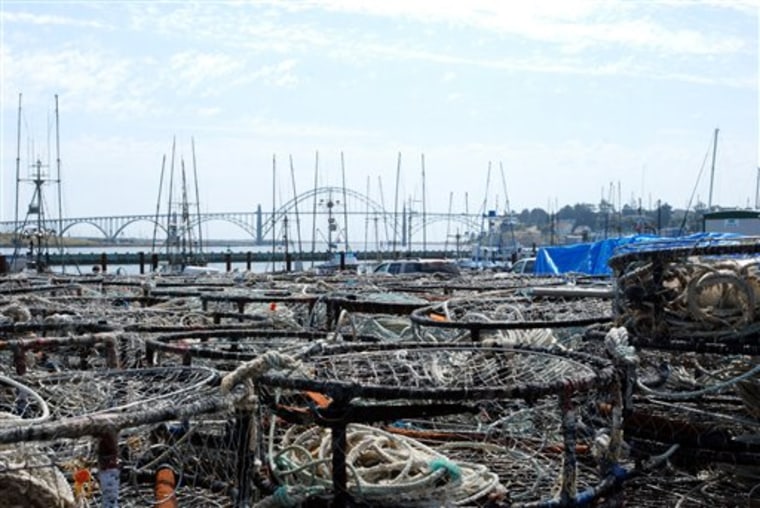During his 35 years as a commercial fisherman, Jeff Feldner lost his share of crab pots when storms blew them out of position, a passing boat propeller sheared off the buoy, or a bank of kelp overwhelmed everything and dragged it away.
As a result, thousands of crab pots litter the ocean floor, creating a deadly obstacle course of brightly colored plastic lines waving in the water, waiting to entangle migrating whales, turtles and sea lions, as well as passing boats.
But once the crab season is completed in August, fishermen will have a chance to get some back in what has been billed as the largest effort ever to recover lost crab pots. A federal stimulus grant of $700,000 will go to hiring fishermen to recover about 4,000 pots — squat cylinders made of stainless steel mesh, rubber and iron to help it sink to the bottom.
"This winter I personally had one of my worst gear losses," said Newport crab fishermen Bob Spelbrink. "I'm missing 60 out of 500. Another friend of mine is missing 90 out 500. So there is a lot of gear out there to be found."
Every year, 10 percent of the 150,000 pots Oregon crabbers put out are lost, said Cyreis Schmitt, marine policy project leader at the Oregon Department of Fish and Wildlife, who wrote the proposal that won the National Oceanic and Atmospheric Administration grant.
Two whales found dead
That amounts to 15,000 newly lost pots every year — and a menacing threat. In the past five years, two whales have washed up dead on the Oregon Coast, entangled in crab pots and lines, said Schmitt.
The federal money will charter 10 boats and hire 48 people — including 31 fishermen who make winning bids — to join in the effort for two seasons.
"This puts to work the people who know the water best," said Jan Lubchenco, the head of NOAA and a former Oregon State University marine ecologist who returned this week to promote the project.
The stimulus project will be a start, but won't eliminate the problem. Thousands more pots will likely remain, continuing to catch crabs in what's called "ghost fishing."
The stimulus money will help crabbers at a time when commercial fishermen have seen their businesses hit hard by unprecedented fishing restrictions, high fuel prices and the national economic downturn.
Dungeness crab is Oregon's most valuable single-species fishery, worth more than $50 million. It's caught mostly during winter, when it commands the best prices around Christmas and New Year's.
Side-scan sonar will be used in the recovery project to spot pots at the mouth of the Columbia River, Schmitt said. Trawlers will then drag a chain rigged with special grappling hooks across the bottom to snag the pots and haul them up.
Buoys hunted as well
Elsewhere, planes will search for buoys, and notify boats to pick them up. There is also a hot line for people to phone in sightings.
At the port of Newport, where the crab pot project was announced, hundreds of derelict pots — found by sheer luck or happenstance — are stacked in a parking lot. They show signs of months and years on the ocean bottom.
Some have scollop shells inside. Others are covered in lacy white growths, the egg casing of whelk snails.
"Marine debris is a global problem that affects the environment, human safety and commerce," said Lubchenco. "Nets and lines can be hazardous to recreational and commercial vessels, and a direct threat to swimmers, divers and marine mammals."
Oregon officials hope the fishing industry will take over after the stimulus money runs out at the end of 2010, said Ed Bowles, fisheries administrator for department.
"This provides the opportunity and the resources for the fishing industry to really step up and develop techniques and expertise to clean up and reduce their contribution to marine debris into the future," he said.
